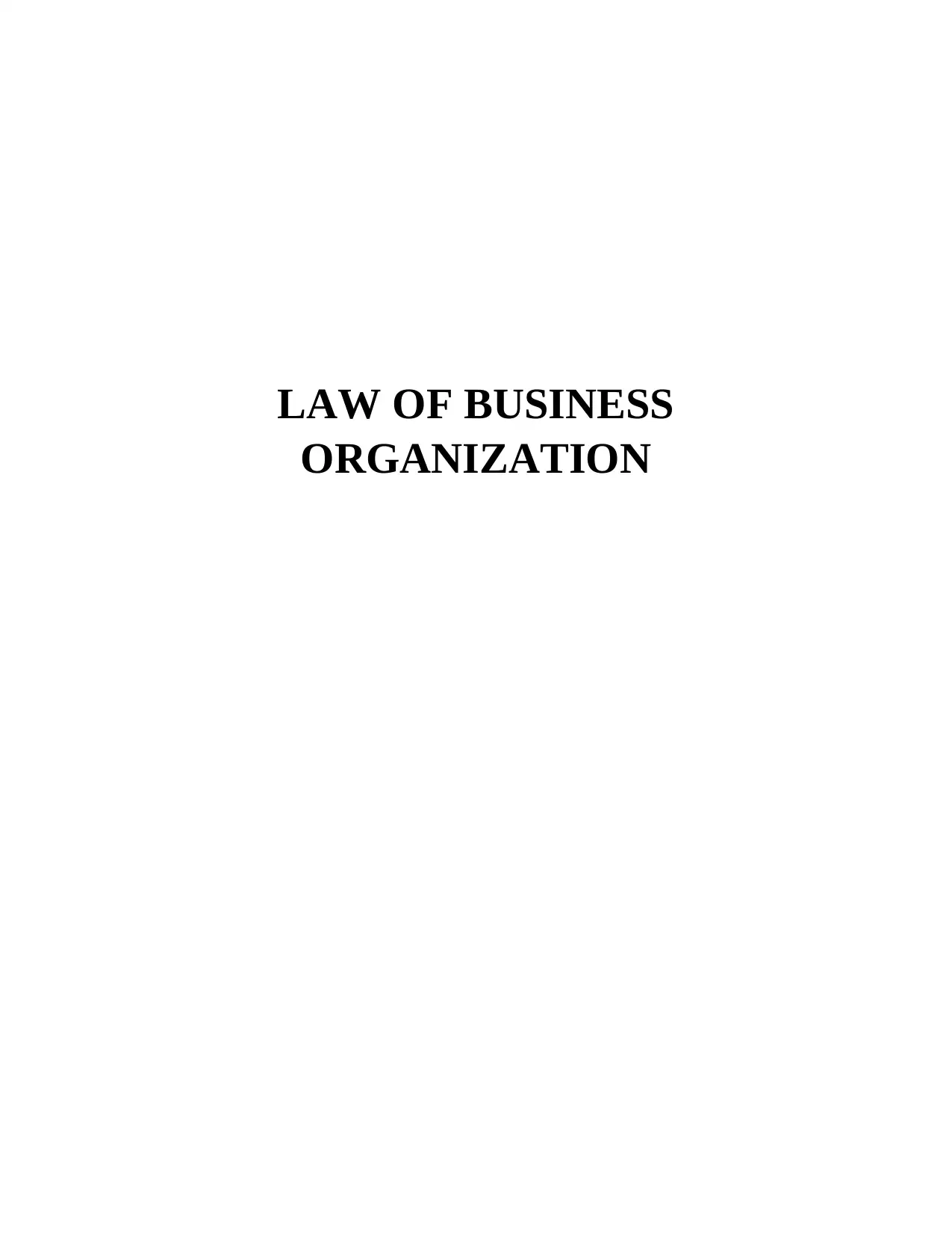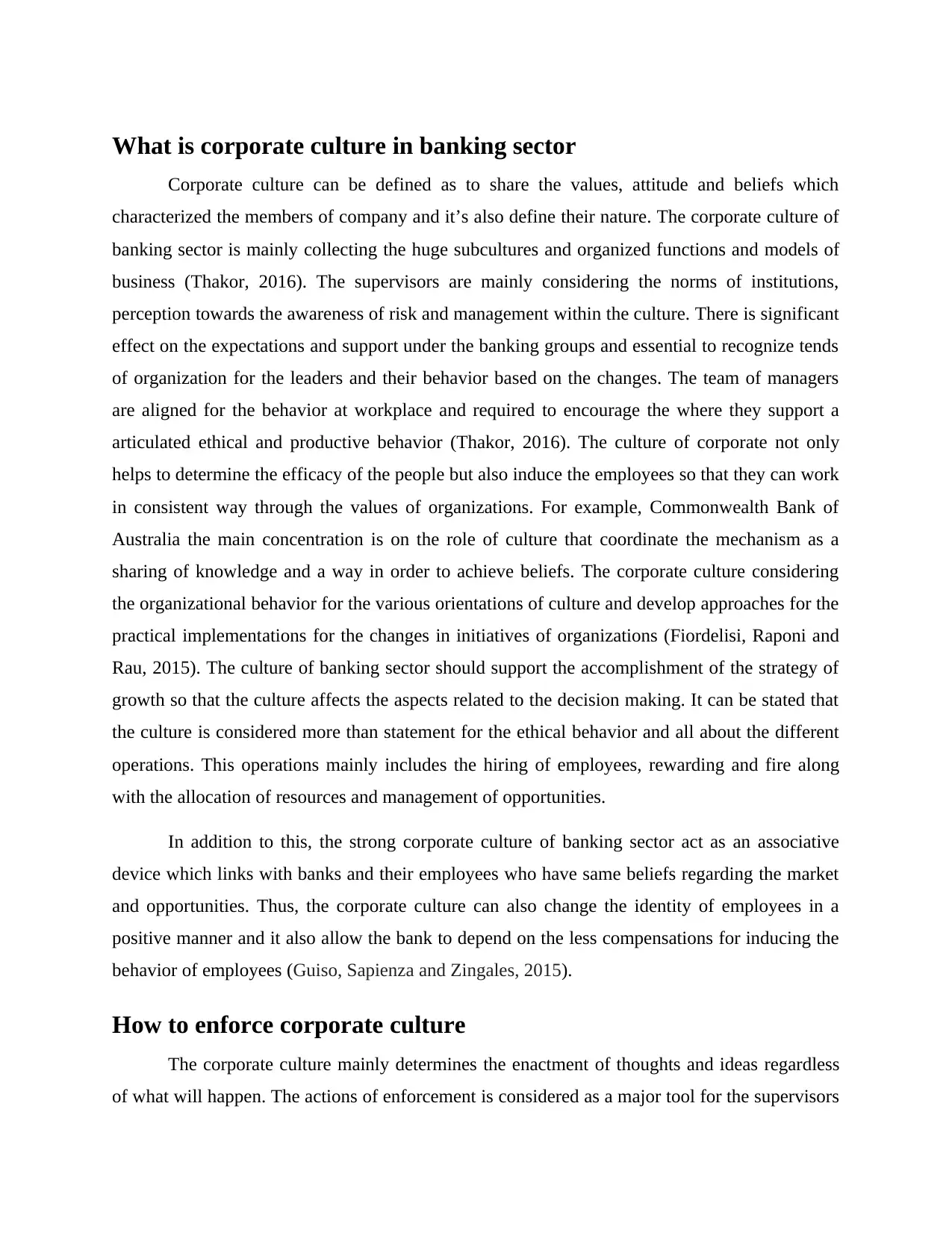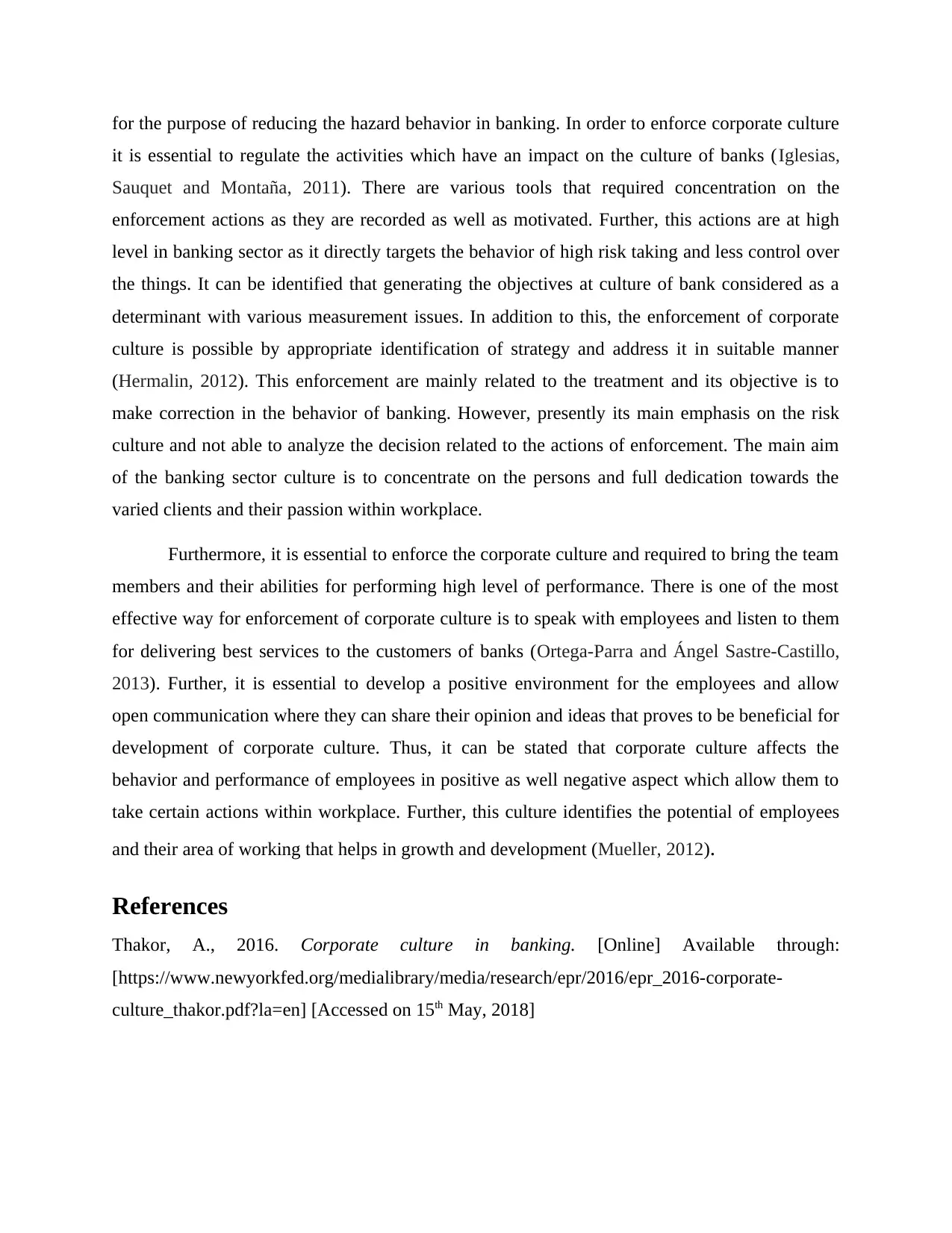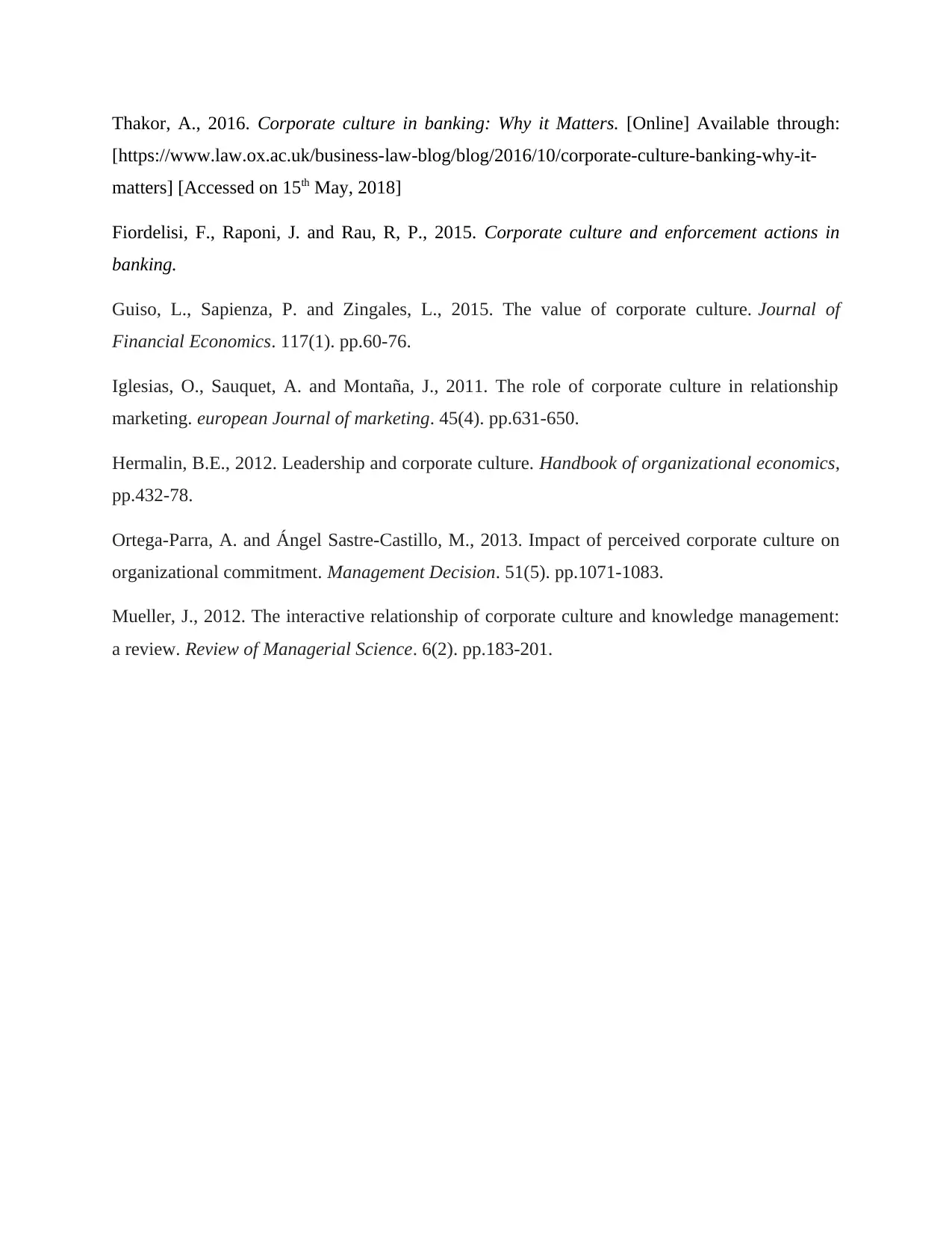Analysis of Corporate Culture and Enforcement in the Banking Sector
VerifiedAdded on 2021/05/27
|5
|1069
|37
Report
AI Summary
This report provides an analysis of corporate culture within the banking sector. It defines corporate culture as the shared values, attitudes, and beliefs that characterize a company's members and influence their behavior. The report highlights how corporate culture in banking involves organizing various subcultures and business models, with supervisors considering institutional norms and risk awareness. It emphasizes the impact of corporate culture on employee behavior, decision-making, and overall performance, providing examples like the Commonwealth Bank of Australia. The report also explores strategies for enforcing corporate culture, including regulating activities, setting objectives, and fostering open communication. It examines the influence of corporate culture on employees' actions and potential, which further aids in the growth and development of the organization. References from various academic sources support the findings, making this report a comprehensive overview of the subject.

LAW OF BUSINESS
ORGANIZATION
ORGANIZATION
Paraphrase This Document
Need a fresh take? Get an instant paraphrase of this document with our AI Paraphraser

Table of Contents
What is corporate culture in banking sector...........................................................................................3
How to enforce corporate culture.............................................................................................................3
References..................................................................................................................................................4
What is corporate culture in banking sector...........................................................................................3
How to enforce corporate culture.............................................................................................................3
References..................................................................................................................................................4

What is corporate culture in banking sector
Corporate culture can be defined as to share the values, attitude and beliefs which
characterized the members of company and it’s also define their nature. The corporate culture of
banking sector is mainly collecting the huge subcultures and organized functions and models of
business (Thakor, 2016). The supervisors are mainly considering the norms of institutions,
perception towards the awareness of risk and management within the culture. There is significant
effect on the expectations and support under the banking groups and essential to recognize tends
of organization for the leaders and their behavior based on the changes. The team of managers
are aligned for the behavior at workplace and required to encourage the where they support a
articulated ethical and productive behavior (Thakor, 2016). The culture of corporate not only
helps to determine the efficacy of the people but also induce the employees so that they can work
in consistent way through the values of organizations. For example, Commonwealth Bank of
Australia the main concentration is on the role of culture that coordinate the mechanism as a
sharing of knowledge and a way in order to achieve beliefs. The corporate culture considering
the organizational behavior for the various orientations of culture and develop approaches for the
practical implementations for the changes in initiatives of organizations (Fiordelisi, Raponi and
Rau, 2015). The culture of banking sector should support the accomplishment of the strategy of
growth so that the culture affects the aspects related to the decision making. It can be stated that
the culture is considered more than statement for the ethical behavior and all about the different
operations. This operations mainly includes the hiring of employees, rewarding and fire along
with the allocation of resources and management of opportunities.
In addition to this, the strong corporate culture of banking sector act as an associative
device which links with banks and their employees who have same beliefs regarding the market
and opportunities. Thus, the corporate culture can also change the identity of employees in a
positive manner and it also allow the bank to depend on the less compensations for inducing the
behavior of employees (Guiso, Sapienza and Zingales, 2015).
How to enforce corporate culture
The corporate culture mainly determines the enactment of thoughts and ideas regardless
of what will happen. The actions of enforcement is considered as a major tool for the supervisors
Corporate culture can be defined as to share the values, attitude and beliefs which
characterized the members of company and it’s also define their nature. The corporate culture of
banking sector is mainly collecting the huge subcultures and organized functions and models of
business (Thakor, 2016). The supervisors are mainly considering the norms of institutions,
perception towards the awareness of risk and management within the culture. There is significant
effect on the expectations and support under the banking groups and essential to recognize tends
of organization for the leaders and their behavior based on the changes. The team of managers
are aligned for the behavior at workplace and required to encourage the where they support a
articulated ethical and productive behavior (Thakor, 2016). The culture of corporate not only
helps to determine the efficacy of the people but also induce the employees so that they can work
in consistent way through the values of organizations. For example, Commonwealth Bank of
Australia the main concentration is on the role of culture that coordinate the mechanism as a
sharing of knowledge and a way in order to achieve beliefs. The corporate culture considering
the organizational behavior for the various orientations of culture and develop approaches for the
practical implementations for the changes in initiatives of organizations (Fiordelisi, Raponi and
Rau, 2015). The culture of banking sector should support the accomplishment of the strategy of
growth so that the culture affects the aspects related to the decision making. It can be stated that
the culture is considered more than statement for the ethical behavior and all about the different
operations. This operations mainly includes the hiring of employees, rewarding and fire along
with the allocation of resources and management of opportunities.
In addition to this, the strong corporate culture of banking sector act as an associative
device which links with banks and their employees who have same beliefs regarding the market
and opportunities. Thus, the corporate culture can also change the identity of employees in a
positive manner and it also allow the bank to depend on the less compensations for inducing the
behavior of employees (Guiso, Sapienza and Zingales, 2015).
How to enforce corporate culture
The corporate culture mainly determines the enactment of thoughts and ideas regardless
of what will happen. The actions of enforcement is considered as a major tool for the supervisors
⊘ This is a preview!⊘
Do you want full access?
Subscribe today to unlock all pages.

Trusted by 1+ million students worldwide

for the purpose of reducing the hazard behavior in banking. In order to enforce corporate culture
it is essential to regulate the activities which have an impact on the culture of banks (Iglesias,
Sauquet and Montaña, 2011). There are various tools that required concentration on the
enforcement actions as they are recorded as well as motivated. Further, this actions are at high
level in banking sector as it directly targets the behavior of high risk taking and less control over
the things. It can be identified that generating the objectives at culture of bank considered as a
determinant with various measurement issues. In addition to this, the enforcement of corporate
culture is possible by appropriate identification of strategy and address it in suitable manner
(Hermalin, 2012). This enforcement are mainly related to the treatment and its objective is to
make correction in the behavior of banking. However, presently its main emphasis on the risk
culture and not able to analyze the decision related to the actions of enforcement. The main aim
of the banking sector culture is to concentrate on the persons and full dedication towards the
varied clients and their passion within workplace.
Furthermore, it is essential to enforce the corporate culture and required to bring the team
members and their abilities for performing high level of performance. There is one of the most
effective way for enforcement of corporate culture is to speak with employees and listen to them
for delivering best services to the customers of banks (Ortega-Parra and Ángel Sastre-Castillo,
2013). Further, it is essential to develop a positive environment for the employees and allow
open communication where they can share their opinion and ideas that proves to be beneficial for
development of corporate culture. Thus, it can be stated that corporate culture affects the
behavior and performance of employees in positive as well negative aspect which allow them to
take certain actions within workplace. Further, this culture identifies the potential of employees
and their area of working that helps in growth and development (Mueller, 2012).
References
Thakor, A., 2016. Corporate culture in banking. [Online] Available through:
[https://www.newyorkfed.org/medialibrary/media/research/epr/2016/epr_2016-corporate-
culture_thakor.pdf?la=en] [Accessed on 15th May, 2018]
it is essential to regulate the activities which have an impact on the culture of banks (Iglesias,
Sauquet and Montaña, 2011). There are various tools that required concentration on the
enforcement actions as they are recorded as well as motivated. Further, this actions are at high
level in banking sector as it directly targets the behavior of high risk taking and less control over
the things. It can be identified that generating the objectives at culture of bank considered as a
determinant with various measurement issues. In addition to this, the enforcement of corporate
culture is possible by appropriate identification of strategy and address it in suitable manner
(Hermalin, 2012). This enforcement are mainly related to the treatment and its objective is to
make correction in the behavior of banking. However, presently its main emphasis on the risk
culture and not able to analyze the decision related to the actions of enforcement. The main aim
of the banking sector culture is to concentrate on the persons and full dedication towards the
varied clients and their passion within workplace.
Furthermore, it is essential to enforce the corporate culture and required to bring the team
members and their abilities for performing high level of performance. There is one of the most
effective way for enforcement of corporate culture is to speak with employees and listen to them
for delivering best services to the customers of banks (Ortega-Parra and Ángel Sastre-Castillo,
2013). Further, it is essential to develop a positive environment for the employees and allow
open communication where they can share their opinion and ideas that proves to be beneficial for
development of corporate culture. Thus, it can be stated that corporate culture affects the
behavior and performance of employees in positive as well negative aspect which allow them to
take certain actions within workplace. Further, this culture identifies the potential of employees
and their area of working that helps in growth and development (Mueller, 2012).
References
Thakor, A., 2016. Corporate culture in banking. [Online] Available through:
[https://www.newyorkfed.org/medialibrary/media/research/epr/2016/epr_2016-corporate-
culture_thakor.pdf?la=en] [Accessed on 15th May, 2018]
Paraphrase This Document
Need a fresh take? Get an instant paraphrase of this document with our AI Paraphraser

Thakor, A., 2016. Corporate culture in banking: Why it Matters. [Online] Available through:
[https://www.law.ox.ac.uk/business-law-blog/blog/2016/10/corporate-culture-banking-why-it-
matters] [Accessed on 15th May, 2018]
Fiordelisi, F., Raponi, J. and Rau, R, P., 2015. Corporate culture and enforcement actions in
banking.
Guiso, L., Sapienza, P. and Zingales, L., 2015. The value of corporate culture. Journal of
Financial Economics. 117(1). pp.60-76.
Iglesias, O., Sauquet, A. and Montaña, J., 2011. The role of corporate culture in relationship
marketing. european Journal of marketing. 45(4). pp.631-650.
Hermalin, B.E., 2012. Leadership and corporate culture. Handbook of organizational economics,
pp.432-78.
Ortega-Parra, A. and Ángel Sastre-Castillo, M., 2013. Impact of perceived corporate culture on
organizational commitment. Management Decision. 51(5). pp.1071-1083.
Mueller, J., 2012. The interactive relationship of corporate culture and knowledge management:
a review. Review of Managerial Science. 6(2). pp.183-201.
[https://www.law.ox.ac.uk/business-law-blog/blog/2016/10/corporate-culture-banking-why-it-
matters] [Accessed on 15th May, 2018]
Fiordelisi, F., Raponi, J. and Rau, R, P., 2015. Corporate culture and enforcement actions in
banking.
Guiso, L., Sapienza, P. and Zingales, L., 2015. The value of corporate culture. Journal of
Financial Economics. 117(1). pp.60-76.
Iglesias, O., Sauquet, A. and Montaña, J., 2011. The role of corporate culture in relationship
marketing. european Journal of marketing. 45(4). pp.631-650.
Hermalin, B.E., 2012. Leadership and corporate culture. Handbook of organizational economics,
pp.432-78.
Ortega-Parra, A. and Ángel Sastre-Castillo, M., 2013. Impact of perceived corporate culture on
organizational commitment. Management Decision. 51(5). pp.1071-1083.
Mueller, J., 2012. The interactive relationship of corporate culture and knowledge management:
a review. Review of Managerial Science. 6(2). pp.183-201.
1 out of 5
Related Documents
Your All-in-One AI-Powered Toolkit for Academic Success.
+13062052269
info@desklib.com
Available 24*7 on WhatsApp / Email
![[object Object]](/_next/static/media/star-bottom.7253800d.svg)
Unlock your academic potential
Copyright © 2020–2025 A2Z Services. All Rights Reserved. Developed and managed by ZUCOL.





